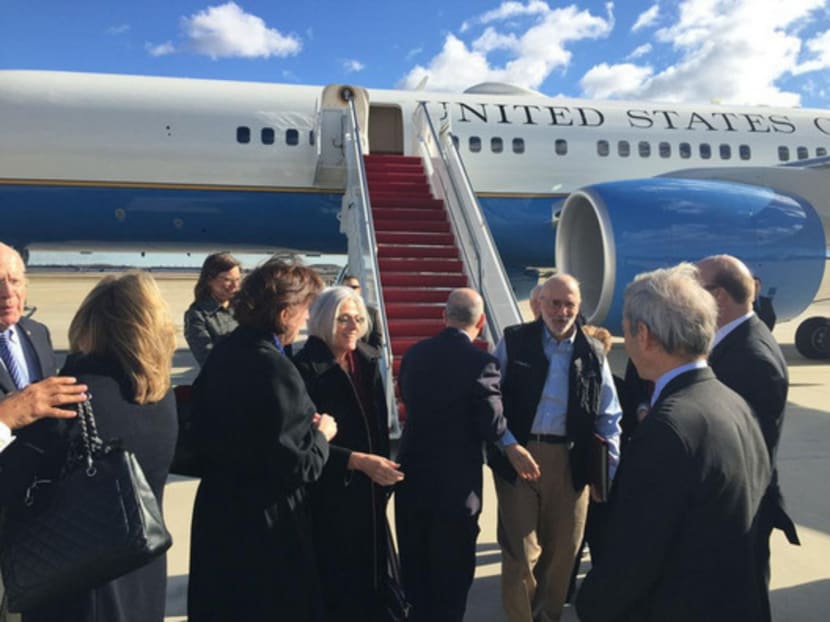US, Cuba move to re-establish ties after more than 50 years
WASHINGTON — The United States has ended its isolation of Cuba that has persisted for more than half a century. The historic move came after a rare private intercession by Pope Francis, the Catholic Church’s first Latin-American pontiff, secret meetings over 18 months between Cuban and American delegations at the Vatican and in Canada, and an extraordinary telephone conversation lasting more than 45 minutes on Tuesday between US President Barack Obama and Cuban leader Raul Castro.
WASHINGTON — The United States has ended its isolation of Cuba that has persisted for more than half a century. The historic move came after a rare private intercession by Pope Francis, the Catholic Church’s first Latin-American pontiff, secret meetings over 18 months between Cuban and American delegations at the Vatican and in Canada, and an extraordinary telephone conversation lasting more than 45 minutes on Tuesday between US President Barack Obama and Cuban leader Raul Castro.
Talks have started to resume diplomatic relations, a US embassy will be opened in Havana and trade and travel restrictions on Cuba will be loosened.
The steps effectively end one of the last remnants of the Cold War, one that has been sacrosanct in US domestic politics. They come as Cuba has sought a shift to gain economic support as its long-time patrons, Russia and Venezuela, have lost influence and been squeezed by plummeting oil prices.
“Neither the American nor Cuban people are well served by a rigid policy that’s rooted in events that took place before most of us were born,” Mr Obama said at the White House early this morning Singapore time. As Mr Obama spoke, Mr Castro addressed his country in a nationally broadcast speech at the same time.
The White House announced the steps after Cuba released American Alan Gross on humanitarian grounds. Following high-level talks between the governments since June last year, the US and Cuba also made a parallel prisoner exchange of three Cuban intelligence agents for a US intelligence asset who had been imprisoned for more than 20 years. Cuba also agreed to release 53 people whom the US considers political prisoners, some of whom have already been released.
The White House plans to move swiftly. It expects to issue regulations within weeks and open an embassy as soon as is logistically possible. Mr Obama said he will work with Congress to lift the full trade embargo. Travellers will be able to use credit and debit cards in Cuba and Americans will be able to legally take home up to US$100 (S$130) in previously illegal Cuban cigars treasured by aficionados.
US companies will be permitted to export to Cuba telecommunications equipment, agricultural commodities, construction supplies and materials for small businesses. American financial institutions will also be allowed to open accounts with Cuban banks.
Limits on Cuban-Americans’ remittances to relatives in their homeland will jump to US$8,000 from US$2,000 annually. US companies will be permitted to export an expansive list of goods including building materials and allowed to build telecommunications infrastructure on the island.
Exports will mainly be permitted to Cuba’s emerging private sector, including residential goods and equipment for small businesses and agriculture.
The President also ordered the State Department to review Cuba’s designation as a state sponsor of terrorism. Cuba has been listed as a terrorism sponsor since 1982. Cuba also agreed to allow greater Internet access for its citizens and easier telecommunications with the US.
Pope Francis played a key role in the talks, sending a letter to Mr Castro and Mr Obama urging them to resolve the dispute over Mr Gross and pursue closer relations. A US official said the request from the Pope came shortly after a meeting Mr Obama had with the Pope at the Vatican earlier this year. The Vatican hosted delegations from the two countries for talks, though most of the meetings were held in Canada.
Mr Gross, a 65-year-old American, was arrested by Cuban officials while working to expand Internet access for Havana’s Jewish community. He was accused of undermining the Cuban state and in December 2009 was sentenced to 15 years in prison.
Trade with Cuba has been severely restricted for half a century due to a Cold War freeze. The US has not had normal diplomatic relations with Cuba since 1961. The two countries had no diplomatic relations until 1977.
Since then, the US has been represented by an interests section within Switzerland’s embassy to Cuba.







